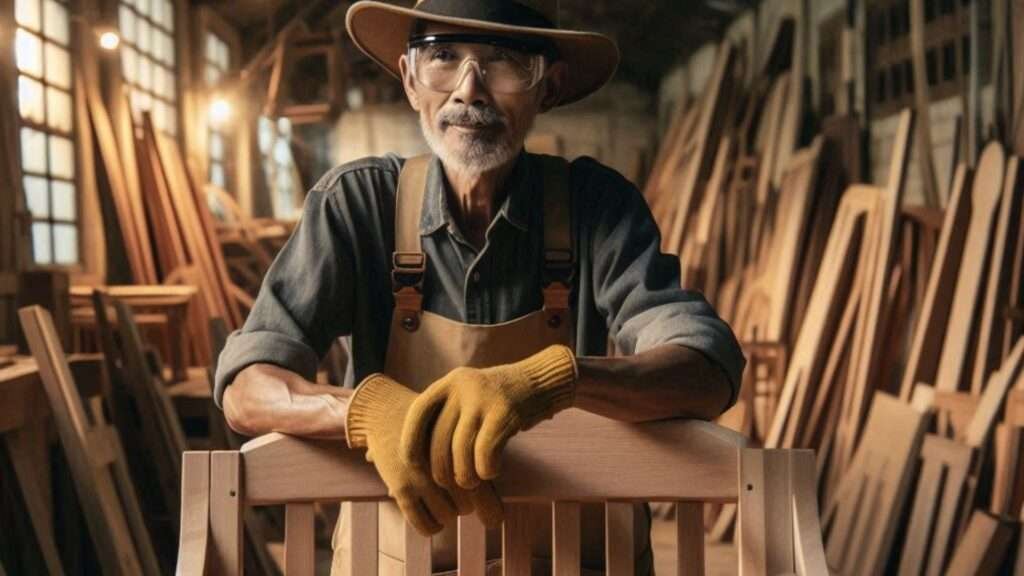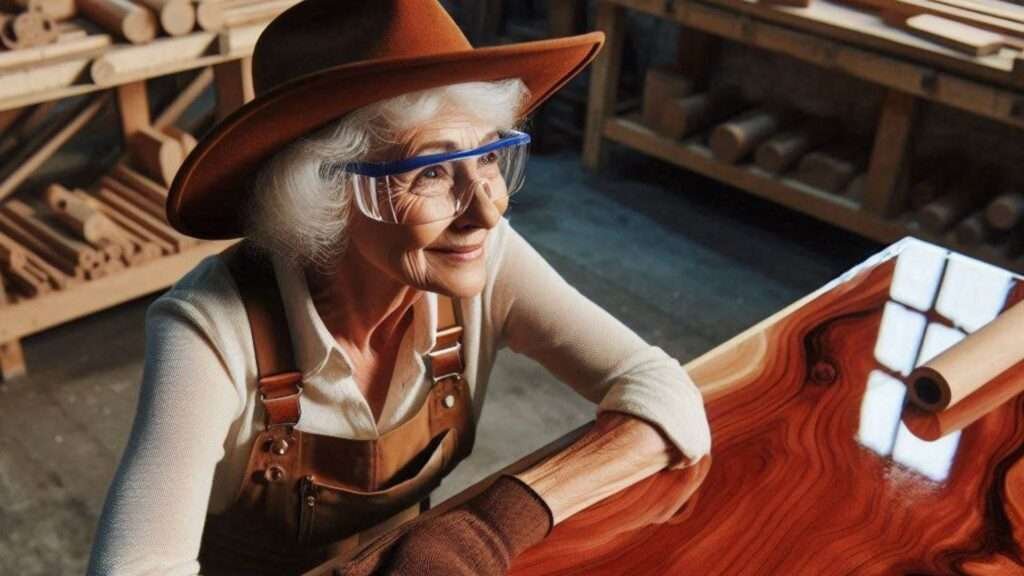Intangible Riches Of Being A Happy Woodworker
Wealth is a term often confined within the boundaries of monetary value, yet it encompasses a much broader spectrum. While financial prosperity holds its undeniable allure, there exists an equally compelling dimension of wealth that transcends the confines of currency.
This dimension is characterized by happiness, fulfilment, and the passion that one harbours for their craft.
The intrinsic rewards of engaging in an activity that resonates deeply within one’s soul can often outweigh the tangible benefits of financial gains.
In the realm of woodworking, the non-monetary wealth derived from the craft is profound. The joy of transforming raw materials into meticulously crafted pieces, the sense of accomplishment that accompanies each completed project, and the continuous journey of honing one’s skills all contribute to a profound sense of personal enrichment.
This form of wealth is not measured by the balance in one’s bank account but by the satisfaction and pride that stem from creating something with one’s own hands.
The passion for woodworking nurtures a unique kind of fulfilment. It is a pursuit that demands patience, creativity, and precision, offering a meditative escape from the hustle and bustle of daily life.
Each stroke of the chisel, each measurement taken, and each piece of wood joined together represents a step towards not just a physical creation, but also a deeper connection with one’s inner self.
This intrinsic reward is invaluable, fostering a sense of purpose and a continuous drive to improve and innovate.
Moreover, the community and camaraderie found among fellow woodworkers further enrich this experience. Sharing tips, exchanging stories, and collaborating on projects create bonds that are both meaningful and enduring. These relationships, built on a shared passion, contribute to a network of support and inspiration, enhancing one’s journey in the craft.
Thus, while woodworking can indeed offer financial rewards, it is the non-monetary wealth, the joy, fulfilment, and passion that truly defines its value.
This intrinsic wealth, immeasurable by conventional means, enriches life in ways that money simply cannot.
The allure of woodworking lies in its blend of creativity, craftsmanship, and the satisfaction of creating tangible, lasting products.
However, despite the passion and dedication that many woodworkers bring to their craft, the financial rewards can be limited. The economic reality of the woodworking industry offers a stark contrast to the dream of becoming a trillionaire through this art form.
First and foremost, the costs associated with woodworking can be substantial. High-quality materials such as hardwoods, specialized tools, and workshop space require a significant financial investment.
Additionally, ongoing costs for maintenance, new tools, and materials can quickly add up.
These expenses are often a barrier to scaling up production, as they can limit the volume of work a woodworker can produce and sell.
Market demand also plays a critical role in the financial limitations of woodworking. While there is a niche market for handcrafted, bespoke pieces, the broader market often leans towards mass-produced, lower-cost options.
This preference places independent woodworkers at a disadvantage when competing with large manufacturers who can produce furniture and other items at a fraction of the cost. Consequently, the earnings potential for individual woodworkers is often constrained by market dynamics.
Moreover, the scale of earnings in the woodworking field is generally modest. According to industry data, the average income for a woodworker varies widely based on experience, location, and the type of work performed.
However, it rarely reaches the heights seen in other professions or industries. The financial success of a woodworker depends on various factors, including their ability to market their products, build a loyal customer base, and manage their business efficiently.
In essence, while woodworking can provide a fulfilling and enjoyable career, it is unlikely to lead to immense financial wealth.
The industry’s economic aspects, including significant costs, market competition, and modest earning potential, present substantial challenges.
The true value of woodworking often lies not in monetary gain but in the passion and satisfaction derived from the craft itself.
The Joy of Mastery and Skill Development.
Engaging in woodworking brings an unparalleled sense of satisfaction that stems from mastering a craft. The journey of developing skills in woodworking is both challenging and rewarding, providing an enriching experience that goes far beyond the tangible outcomes.
As a woodworker hones their skills, the act of creating something with their hands becomes a source of immense pride. Each meticulously carved piece, every joint perfectly fitted and the final polished product is a testament to the woodworker’s dedication and expertise.
The process of skill development in woodworking involves a continuous cycle of learning and improvement. From understanding the grain of different types of wood to mastering the use of various tools and techniques, each step is a building block towards achieving mastery.
This journey is not just about acquiring technical skills but also about developing a keen eye for detail, patience, and a deep appreciation for the craft.
Furthermore, the joy derived from woodworking is amplified by the act of continual learning. No matter how experienced a woodworker becomes, there is always something new to learn and explore.
This perpetual state of growth keeps the passion alive and fosters a sense of personal wealth that is unquantifiable. The satisfaction of overcoming challenges, discovering new methods, and perfecting techniques contributes significantly to one’s sense of achievement.
In essence, the joy of mastering woodworking and the process of skill development are integral to the personal fulfilment that comes from this craft. The pride in creating something beautiful and functional, coupled with the joy of continual learning, enriches the woodworker’s life in ways that go beyond financial gain.
This sense of personal wealth, cultivated through dedication and passion, is a priceless attribute of being a devoted woodworker.
The Community and Camaraderie in a Thriving Woodshop.
Being part of a vibrant woodworking community offers an array of unquantifiable benefits that extend far beyond the individual skills honed at the workbench. One of the most enriching aspects of this community is the camaraderie that flourishes within a thriving woodshop.
When surrounded by like-minded individuals who share a passion for woodworking, the sense of belonging and mutual support becomes palpable.
In a bustling woodshop, the exchange of ideas and techniques happens organically. Experienced woodworkers often mentor newcomers, fostering an environment where learning is a continuous, communal effort.
This dynamic not only elevates individual craftsmanship but also strengthens the collective knowledge of the group. The shared passion for woodworking creates a bond that transcends age, background, and experience level, knitting together a diverse and inclusive community.
The support system within a woodshop is invaluable. From troubleshooting complex joinery to celebrating the completion of a challenging project, the encouragement and constructive feedback from fellow woodworkers enhance both personal and professional growth.
This mutual support helps mitigate the isolation that can often accompany solitary woodworking pursuits, making the creative process more enjoyable and fulfilling.
Moreover, the relationships built within a woodshop extend beyond the confines of woodworking. The social interactions fostered in this setting often evolve into lasting friendships, enriching one’s life in multiple dimensions.
Whether it’s sharing a meal after a long day of crafting or participating in community events and woodworking shows, these connections contribute significantly to an individual’s sense of happiness and overall well-being.
Ultimately, the community and camaraderie found in a thriving woodshop offer more than just practical knowledge and skill enhancement.
They provide a sense of belonging and shared purpose, making the woodworking journey a deeply rewarding and enriching experience. This sense of community not only enhances individual lives but also strengthens the collective spirit of the woodworking world, creating a nurturing environment where creativity and passion can flourish.
For many passionate woodworkers, the day begins with an invigorating sense of anticipation. The thought of immersing oneself in the creative process, shaping raw materials into beautiful, functional pieces, is an unparalleled source of motivation.
This enthusiasm is not merely a fleeting feeling but a sustained energy that fuels every step of their craft. Unlike the transient satisfaction derived from monetary wealth, the joy of pursuing a passion in woodworking is a constant companion.
Waking up with a purpose is transformative. The knowledge that each day presents an opportunity to work on something one loves infuses the mundane with meaning.
As a woodworker, the tactile pleasure of handling various types of wood, the smell of fresh sawdust, and the rhythmic sounds of tools at work are daily affirmations of one’s chosen path.
These sensory experiences are more than just by-products of the trade; they are integral to the deep-seated fulfilment that passionate woodworkers often describe.
This daily joy manifests in a heightened sense of creativity and innovation. When driven by passion, woodworkers are more likely to explore new techniques, experiment with designs, and push the boundaries of their craft.
The motivation spurred by genuine interest leads to a cycle of continuous learning and improvement, which is far more rewarding than the pursuit of financial gain alone.
The intrinsic pleasure derived from creating something with one’s own hands is a form of richness that can’t be quantified by conventional measures.
Moreover, the energy that comes from working in a field one is passionate about often spills over into other areas of life.
It fosters a positive mindset, which can enhance personal relationships and overall well-being. The fulfilment gained from woodworking creates a sense of balance, reducing stress and promoting mental clarity.
In essence, the daily joy of pursuing one’s passion in woodworking offers a holistic form of wealth that transcends monetary value.
The Value of Creating Something Tangible and Lasting.
In a digital age where much of our work exists in the ether, the value of creating something tangible and lasting cannot be overstated.
For a passionate woodworker, the act of transforming raw materials into a finished product is a deeply rewarding experience, unrivalled by monetary gains alone.
The physicality of woodworking, the smell of freshly cut lumber, the feel of freshly cut wood grain beneath one’s fingers or the sound of tools shaping wood provides a sensory connection to the craft that is profoundly satisfying.
One of the primary joys of woodworking is the creation of pieces that stand the test of time. Whether it’s a finely crafted piece of furniture, an intricately designed jewellery box, or a beautifully turned bowl, these items are not just objects; they are heirlooms in the making.
Each project carries with it a sense of achievement and a story of its creation, which can be passed down through generations, making the effort and skill invested a lasting legacy.
The sense of accomplishment derived from woodworking is multifaceted. On one hand, there is the immediate gratification that comes from seeing a project take shape under one’s hands.
On the other, there is the enduring pride in knowing that one’s work will be used and appreciated for years to come. This dual satisfaction is something that many modern professions, which often result in ephemeral outputs, cannot offer.
Examples of woodworking projects are as varied as the imaginations of the craftsmen who create them.
Functional items like tables, chairs, and cabinets marry utility with aesthetic appeal, while decorative pieces such as carved sculptures, picture frames, and ornate boxes showcase artistic talents.
More personalized projects, like custom-made guitars or bespoke kitchen utensils, further highlight the unique skills and creative vision of the woodworker.
Ultimately, the value in creating something tangible and lasting lies not just in the finished product, but in the journey of craftsmanship itself.
Each cut, joint, and finish applied to a piece of wood is a testament to the woodworker’s dedication and passion, qualities that imbue each creation with an intrinsic worth that transcends monetary value.
Redefining Wealth: Beyond Dollars and Cents.
In today’s fast-paced, consumer-driven world, the concept of wealth is often narrowly defined by monetary value.
However, for a passionate woodworker, wealth transcends the mere accumulation of financial assets. It is imperative to broaden our understanding of wealth to include intangible yet profoundly enriching dimensions such as happiness, fulfilment, relationships, and personal growth.
Happiness, for instance, is an elusive treasure that cannot be quantified in dollars and cents. The joy derived from creating something beautiful and functional with one’s own hands is a form of wealth that goes beyond the balance sheet.
The satisfaction of seeing a project come to life, the tactile pleasure of working with different types of wood, and the pride in a well-executed piece are all invaluable experiences that contribute to a woodworker’s sense of well-being.
Fulfilment is another critical element of this expanded definition of wealth. Engaging in woodworking allows individuals to express their creativity, solve problems, and continually improve their skills.
This sense of accomplishment and purpose provides a deep sense of contentment that is often absent in more financially lucrative but less personally rewarding endeavours.
Relationships also form a significant part of this broader concept of wealth. The woodworking community is a diverse and supportive network where knowledge and experiences are freely shared.
These connections foster a sense of belonging and mutual respect, enriching the lives of all involved. Furthermore, the ability to create customized, meaningful gifts and furniture strengthens personal relationships and creates lasting memories.
Personal growth is yet another dimension that contributes to this enriched view of wealth. Woodworking challenges individuals to continually learn and adapt, fostering resilience and self-reliance.
The skills and lessons gained through this craft extend beyond the workshop, positively impacting other areas of life.
Thus, while financial wealth has its place, it is the immeasurable rewards happiness, fulfilment, relationships, and personal growth that truly define the richness of being a passionate woodworker.
By embracing this holistic view, one can find a deeper, more enduring form of wealth that enhances every aspect of life.
Conclusion: The Trillionaire Mindset in Woodworking.
The journey through the craft of woodworking reveals a treasure trove of intangible rewards that far surpass mere financial gain.
Each section has illuminated the various facets that contribute to the profound richness experienced by passionate woodworkers.
From the initial spark of creativity to the meticulous process of bringing a vision to life, woodworking offers a unique blend of intellectual stimulation, artistic expression, and tangible accomplishment.
Throughout this Blog post, we have explored how the hands-on nature of woodworking fosters a deep sense of satisfaction and pride.
The skills honed over time lead to mastery, and with mastery comes a profound sense of personal achievement.
The ability to craft something beautiful and functional from raw materials is a testament to human ingenuity and dedication, attributes that make any woodworker feel truly wealthy in spirit.
The woodworking community itself provides a wealth of social connections and shared knowledge.
Engaging with fellow woodworkers, whether through local clubs or online forums, creates a sense of belonging and mutual support.
These relationships enrich the woodworker’s journey, offering both inspiration and camaraderie.
The true value of woodworking lies in the joy it brings. The tactile experience of shaping wood, the meditative process of sanding and finishing, and the final reveal of a completed project all contribute to a profound sense of fulfilment.
This is the essence of the trillionaire mindset in woodworking: recognizing and cherishing the non-monetary riches that come with pursuing a passion.
I encourage you to embrace your own passions, whatever they may be, and to find their own unique sources of joy and fulfilment.
In doing so, you too can experience the unquantifiable riches that make life truly rewarding.








